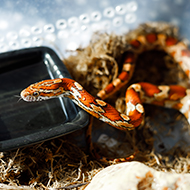
A product recall has been issued, alongside general vigilance advice.
The Food Standards Agency (FSA) is issuing advice to reptile owners following an outbreak of human salmonellosis linked to frozen mice used to feed animals.
Specific frozen mice products have been linked to the current outbreak, and a recall on all frozen Feeder Mice products produced by Monkfield Nutrition has been issued. A full list of all recalled products can be found here.
Alongside informing reptile owners to return any affected supplies to the place of purchase, the FSA, along with Food Standards Scotland, Defra, APHA, the UK Health Security Agency, Public Health Wales and Public Health Scotland, is warning reptile owners to be careful when handling any frozen rodents, due to salmonella risk.
A spokeperson for the government said: “In September this year, the FSA introduced new requirements for shops to provide a leaflet warning about the risks of Salmonella and how to keep customers safe when buying and feeding frozen mice to their reptiles.
“However, the outbreak continues and a full withdrawal and recall of the specific batches of frozen mice is necessary.
“The withdrawal and recall does not affect rats from the same supplier, however investigations are continuing, should concerns about the safety of rats be identified, advice will be updated.
“Therefore, if you have the affected feeder mice product in your freezer, please return it to where you purchased it from so it can be disposed of carefully and thoroughly clean and disinfect any surfaces it has been in contact with, including your hands.
“We are also asking people to be extra vigilant with all frozen rodent product, however, do check the specific information about which batches are involved as retailers will not be accepting other material.”
The FSA is encouraging reptile owners to be vigilant about hand-washing, and to wash their hands immediately after coming into contact with the product. It is also advising owners to wash their hands immediately after handling reptiles and their associated equipment and environment.



 The Veterinary Medicines Directorate (VMD) is inviting applications from veterinary students to attend a one-week extramural studies (EMS) placement in July 2026.
The Veterinary Medicines Directorate (VMD) is inviting applications from veterinary students to attend a one-week extramural studies (EMS) placement in July 2026.